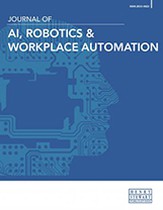Machine unlearning for generative AI
Abstract
This paper introduces a new field of AI research called machine unlearning and examines the challenges and approaches to extend machine unlearning to generative AI (GenAI). Machine unlearning is a model-driven approach to make an existing artificial intelligence (AI) model unlearn a set of data from its learning. Machine unlearning is becoming important for businesses to comply with privacy laws such as General Data Protection Regulation (GDPR) customer’s right to be forgotten, to manage security and to remove bias that AI models learn from their training data, as it is expensive to retrain and deploy the models without the bias or security or privacy compromising data. This paper presents the state of the art in machine unlearning approaches such as exact unlearning, approximate unlearning, zero-shot learning (ZSL) and fast and efficient unlearning. The paper highlights the challenges in applying machine learning to GenAI which is built on a transformer architecture of neural networks and adds more opaqueness to how large language models (LLM) learn in pre-training, fine-turning, transfer learning to more languages and in inference. The paper elaborates on how models retain the learning in a neural network to guide the various machine unlearning approaches for GenAI that the authors hope can be built upon their work. The paper suggests possible futuristic directions of research to create transparency in LLM and particularly looks at hallucinations in LLMs when they are extended to do machine translation for new languages beyond their training with ZSL to shed light on how the model stores its learning of newer languages in its memory and how it draws upon it during inference in GenAI applications. Finally, the paper calls for collaborations for future research in machine unlearning for GenAI, particularly LLMs, to add transparency and inclusivity to language AI.
The full article is available to subscribers to the journal.
Author's Biography
Yashaswini Viswanath works as Resident Researcher at Business School of AI in the realm of responsible artificial intelligence (AI). She comes from a strong engineering background, with approximately ten years of experience in the software industry. Many of her intelligent automations have reduced person hours in her organisation, Mindtree. Her fascination with AI started when she was an undergrad student, and she loves the idea of AI applications touching people’s lives. At Business School of AI, she has hosted WeeklyWed, an international speaker series on AI and Internet of Things (IoT). Also, as a resident researcher, she has worked on multiple projects regarding responsible AI, to make the world a better place for AI and humans to thrive together.
Sudha Jamthe is a Technology Futurist with a mix of global, innovation and business operations experience. She enjoys shaping early technology ecosystems by educating and mentoring business professionals to learn to innovate with exponential technologies with a focus on the gap between the depths of technology and business strategy. Her research includes inclusive artificial intelligence (AI) in autonomous vehicles (AV), LLM, and AIX design for shared space and AI for gender equality. Sudha develops curricula about AI and AI ethics and teaches product managers and business professionals at Stanford Continuing Studies, Barcelona Technology School Masters programme and business professionals at BusinessSchoolofAI.com and visiting group of Executive MBA Leaders. Her topics include generative AI, data science for business users using No-Code AI, AIX (UX of AI) and AI ethics. She is the author of seven books, three about Internet of Things (IoT), two about AV and one about AIX: designing AI. The latest is about Generative AI (GenAI). Sudha’s keynotes are about AIX, AI ethics and AV with a futuristic lens to major conferences TU-Automotive, IoT World, IoT Solutions World Congress (Barcelona), Re:Work, IoTSlam. She has also spoken at Berkeley University, Barcelona Technology School (commencement 2020), Bentley College MBA Program, Suffolk University, SRM Engineering College (Group of Faculty) and NorthWestern Polytechnic. Sudha serves in select global advisories including FundingBox (ICCAR) and NGI Europe, IoT Council Think Tank. Sudha does select advisory sessions for transportation departments, industry executives and boards of directors with a futuristic lens on AV, AI to guide on preparing for AI innovation and mobility. She drives GirlsWhoCode, the seventh year of IoTWomen and IWD Womansplaining and WeeklyWed learning communities online. Sudha is the co-founder of GlobalSouthinAI.org, a USA-based NGO affiliated as an affinity group of NeurIPS AI conference, where she trains new AI researchers from global south languages. She also serves as a judge for the annual Congressional App Challenge (US) and select STEM student competitions. Sudha has a MBA from Boston University and Computer Science Engineering from Madras University.
Suresh Lokiah is an Engineering Leader with more than 20 years experience from Silicon Valley. He was a pioneer in search engines from Altavista and Yahoo! and has helped build Internet of Things (IoT) solutions with cameras for Alarm.com, Arlo and now at Xperi. He has worked in consumer electronics at TiVo, leader in DVR technology. Suresh brings a penchant for solving complex problems and collaborating across engineering and business organisations to scale early-stage technologies to commercialised products to help society. He has been part of the evolution of technology industry from search engines to data solutions to AI and brings that knowledge to AI research across industries today. He has a BSc degree in physics from University of Madras, India.
Emanuele Bianchini is an entrepreneur with 30 years of experience in developing innovative hardware and digital products. His expertise is in extracting value from technology. The key ingredient is to match the technology with the customer’s need in a realistic and objective manner. His products won innovation awards in the aerospace, automotive, sporting goods, and industrial sectors. Emanuele’s AI work has recently focused on the creation of value from data. He has experience with several ML and GenAI tools and services as he continues to merge AI technology with human needs. Emanuele holds 9 patents.
